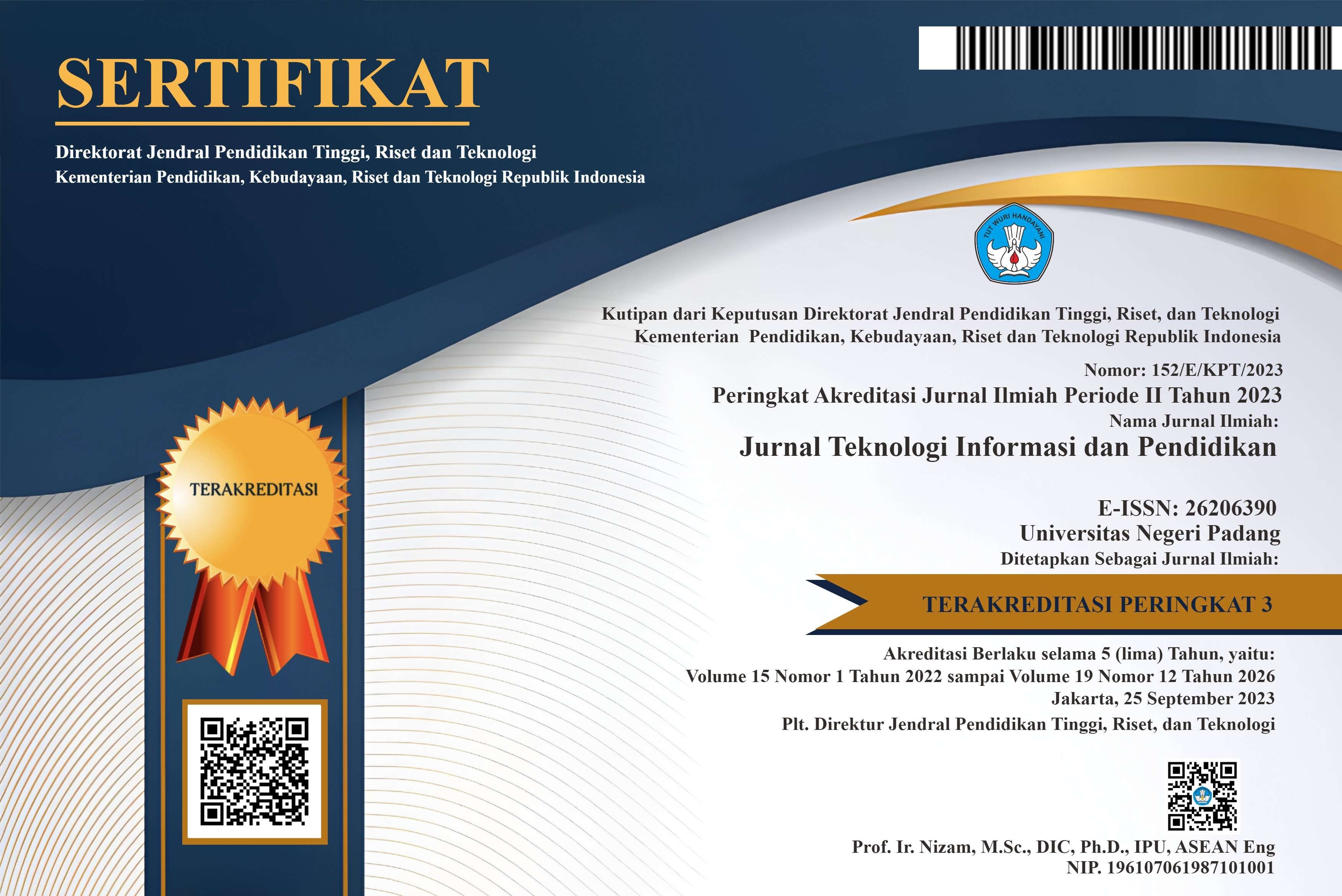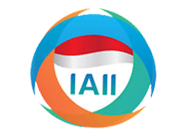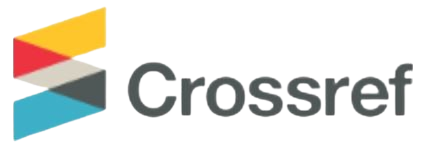Development of Project-Based Information and Communication Technology Vocasional Skills Book for Special Junior High School
Abstract
ICT vocational skills subject at Special Junior High School did not have a learning book for special need students. As a result, the students who have intellectual disabilities have many problems to learn independently. This condition also impacted on student learning outcomes that did not reach the targeted competencies. The purpose of this research is to produce a project-based ICT vocational skills book for Special Junior High School that is valid, practical and effective for learning uses. This study uses research and development (R&D) method with 4D model through Define, Design, Develop, and Disseminate stages. The data were collected using a questionnaire and one group pre-test and post-test design. The results of the study, it concluded that the project-based ICT vocational skills book for Special Junior High School is feasible, very practical and effective for learning use.
References
M. V. Tikam, “Impact of ICT on Education,” International Journal of Information Communication Technologies and Human Development, vol. 5, no. 4, pp. 1–9, Oct. 2013, doi: 10.4018/IJICTHD.2013100101.
G. E. Kennedy, T. S. Judd, A. Churchward, K. Gray, and K. L. Krause, “First year students’ experiences with technology: Are they really digital natives?,” Australasian Journal of Educational Technology, vol. 24, no. 1, pp. 108–122, Jan. 2008, doi: 10.14742/AJET.1233.
E. Adamopoulou and L. Moussiades, “Chatbots: History, technology, and applications,” Machine Learning with Applications, vol. 2, p. 100006, Dec. 2020, doi: 10.1016/J.MLWA.2020.100006.
S. Yang, P. Fichman, X. Zhu, M. Sanfilippo, S. Li, and K. R. Fleischmann, “The use of ICT during COVID‐19,” Proc Assoc Inf Sci Technol, vol. 57, no. 1, Oct. 2020, doi: 10.1002/PRA2.297.
K. S. Hong and P. Songan, “ICT in the changing landscape of higher education in Southeast Asia,” Australasian Journal of Educational Technology, vol. 27, no. 8, pp. 1276–1290, Dec. 2011, doi: 10.14742/AJET.893.
J. Gil-Flores, J. Rodríguez-Santero, and J. J. Torres-Gordillo, “Factors that explain the use of ICT in secondary-education classrooms: The role of teacher characteristics and school infrastructure,” Comput Human Behav, vol. 68, pp. 441–449, Mar. 2017, doi: 10.1016/J.CHB.2016.11.057.
T. Shamir-Inbal and I. Blau, “Micro-learning in designing professional development for ICT teacher leaders: The role of self-regulation and perceived learning,” Professional Development in Education, 2020, doi: 10.1080/19415257.2020.1763434.
R. W. Berkowsky, S. R. Cotton, E. A. Yost, and V. P. Winstead, “Attitudes Towards and Limitations to ICT Use in Assisted and Independent Living Communities: Findings from a Specially-Designed Technological Intervention,” Educ Gerontol, vol. 39, no. 11, pp. 797–811, Nov. 2013, doi: 10.1080/03601277.2012.734162.
A. F. Yogananti and D. I. I. Ulumuddin, “College Student’s Perception toward ‘ Peduli Lindungi’ Application through the Usability Scale Method,” Jurnal Teknologi Informasi dan Pendidikan, vol. 15, no. 2, pp. 73–83, Feb. 2022, doi: 10.24036/JTIP.V15I2.623.
R. P. Dhaniawaty and A. P. Fadilah, “Design of Interactive Learning Media for Human Respiratory System Topic,” Jurnal Teknologi Informasi dan Pendidikan, vol. 14, no. 3, pp. 257–263, 2021, doi: 10.24036/JTIP.V14I3.450.
B. A. A. Putra and S. Sukirman, “A Development of Multiplayer Educational Game as Learning Media to Introduce to Computer Hardware,” Jurnal Teknologi Informasi dan Pendidikan, vol. 16, no. 1, pp. 14–26, May 2023, doi: 10.24036/JTIP.V16I1.693.
C. M. Malladi, R. K. Soni, and S. Srinivasan, “Digital financial inclusion: next frontiers—challenges and opportunities,” CSI Transactions on ICT 2021 9:2, vol. 9, no. 2, pp. 127–134, Aug. 2021, doi: 10.1007/S40012-021-00328-5.
P. W. A. Suyasa, D. G. H. Divayana, and M. R. Kristiantari, “The effect of digital books based on kvisoft flipbook maker on student learning outcomes,” J Phys Conf Ser, vol. 1810, no. 1, pp. 10–15, 2021, doi: 10.1088/1742-6596/1810/1/012046.
T. Mays, “21 st Century Skills for Sustainable Development Overview,” 2020.
A. Ghofur, “Digital Comic Media on Smartphones to Improve Communication Skills,” Journal of Innovation in Educational and Cultural Research, vol. 3, no. 3, pp. 432–444, 2022.
S. Ghavifekr, A. Zabidi, A. Razak, and H. B. Kenayathulla, “Career Management Skills for TVET Colleges : A Conceptual Review,” Asian journal of research and management, vol. 3, no. 1, pp. 1–12, 2021.
W. E. D. Radianto and O. Y. A. Wijaya, “Project Based Learning and Innovation in Entrepreneurship Education,” International Journal of Applied Business and Economic Research, vol. 15, no. 25, pp. 129–140, 2017, [Online]. Available: http://dspace.uc.ac.id/handle/123456789/2664
J. Luo and T. Wang, “Analyzing students’ behavior in blended learning environment for programming education,” ACM International Conference Proceeding Series, pp. 179–185, 2020, doi: 10.1145/3425329.3425346.
L. Briz-Ponce, A. Pereira, L. Carvalho, J. A. Juanes-Méndez, and F. J. García-Peñalvo, “Learning with mobile technologies – Students’ behavior,” Comput Human Behav, vol. 72, pp. 612–620, Jul. 2017, doi: 10.1016/J.CHB.2016.05.027.
Y. Yusmaningsih, V. I. Delianti, L. Mursyida, and R. Marta, “Development of Interactive Learning Media Based on Motion Graphic Animation for Basic Photography Subject,” Journal of Hypermedia & Technology-Enhanced Learning (J-HyTEL), vol. 2, no. 3, pp. 304–319, Oct. 2024, doi: 10.58536/J-HYTEL.V2I3.146.
Sugiyono, Metodologi Penelitian Kuantitatif, Kualitatif, dan R&D. 2016. doi: https://doi.org/10.3929/ethz-b-000238666.
S. Fahmi, S. W. Priwantoro, R. A. Cahdriyana, A. Hendroanto, S. N. Rohmah, and L. C. Nisa, “Interactive Learning Media Using Kvisoft Flipbook Maker for Mathematics Learning,” J Phys Conf Ser, vol. 1188, no. 1, 2019, doi: 10.1088/1742-6596/1188/1/012075.
Haryanto, Asrial, and M. D. W. Ernawati, “E-worksheet for science processing skills using kvisoft flipbook,” International journal of online and biomedical engineering, 2020, doi: 10.3991/IJOE.V16I03.12381.
Copyright (c) 2024 Jurnal Teknologi Informasi dan Pendidikan

This work is licensed under a Creative Commons Attribution-ShareAlike 4.0 International License.
PDF downloaded = 57 times















.png)














